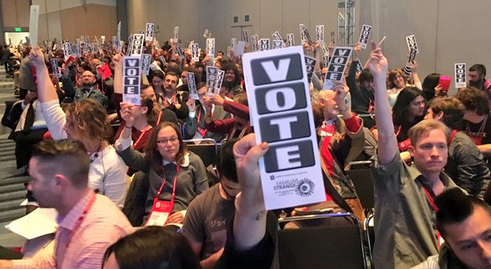You have /5 articles left.
Sign up for a free account or log in.

Anthropologists gather for votes on boycott resolutions.
Photo by Alex Shams
DENVER -- Members of the American Anthropological Association voted in favor of a resolution calling on the group to boycott Israeli academic institutions by a 1,040 to 136 margin at the association’s annual business meeting on Friday evening.
The resolution will be put to a vote by the full AAA membership in the spring. A simple majority vote in favor of the resolution would make the academic boycott association policy. Unlike the Modern Language Association, the AAA does not require a minimum percentage of members to vote on a resolution for it to take effect.
 Proponents of the academic boycott see it as a way of protesting Israel’s continued hold on some territories occupied in the Six Day War in 1967, and of standing up for the rights of Palestinians. A motion calling on the AAA to divest from corporations that "profit from the violation of Palestinian human rights and the illegal occupation" also passed on Friday. But because that divestment motion was introduced on the floor (as opposed to the boycott resolution, which was submitted in advance), it will go to the association’s executive board for its consideration and will not automatically be placed on the spring ballot.
Proponents of the academic boycott see it as a way of protesting Israel’s continued hold on some territories occupied in the Six Day War in 1967, and of standing up for the rights of Palestinians. A motion calling on the AAA to divest from corporations that "profit from the violation of Palestinian human rights and the illegal occupation" also passed on Friday. But because that divestment motion was introduced on the floor (as opposed to the boycott resolution, which was submitted in advance), it will go to the association’s executive board for its consideration and will not automatically be placed on the spring ballot.
The American Association of University Professors opposes academic boycotts as contradictory to fundamental principles of academic freedom and the free exchange of ideas. But over the past two years, the boycott, divestment and sanctions movement against Israel has gained momentum in academe, with a handful of U.S.-based scholarly associations -- most notably the American Studies Association -- backing the boycott call. If the more than 10,000-member AAA ultimately follows suit, it would be the largest association to endorse the academic boycott to date.
More than 1,000 anthropologists have already signed on to the boycott of Israeli universities in their individual capacities.
“It’s significant for us, as anthropologists, for the association, that we’ve been able to get to this point where we are prepared to take a collective stand on behalf of Palestinians, Palestinian rights, and in solidarity with our Palestinian colleagues,” said Ilana Feldman, an anthropologist at George Washington University and one of the signatories to the pro-boycott resolution. “This is an issue that is obviously often very difficult to discuss honestly and openly. The fact that we’ve able to have the conversation, to educate ourselves collectively and to be able to come to a collective stand, I think is just remarkable for us.”
“I think this will amplify across the academic landscape,” Feldman added. “The fact that we are now moving in this direction will speak to other associations.”
Defeat of an Antiboycott Measure
The vote in favor of boycott came after attendees at the AAA business meeting soundly defeated an alternative, antiboycott resolution pushed by a group of Israeli and North American academics that calls itself Anthropologists for Dialogue on Israel/Palestine. The text of that resolution, which was defeated by a 1,173 to 196 tally, called for an end to the occupation while also rejecting boycott in favor of strengthened “anthropological engagement with Palestine and Israel.”
The antiboycott resolution also called for the AAA to raise money via a voluntary contribution drive to fund grants, scholarships, seminars and other scholarly activities that would focus on "understanding conflict generally and the Israeli-Palestinian conflict in particular."
“Boycotts conflate academics with their governments and create an artificial distinction between individuals and the institutions in which they live and work,” Gila Silverman, a newly minted Ph.D. from the University of Arizona, said in introducing the antiboycott resolution.
“It has been suggested that harming our Israeli colleagues, many of whom have devoted decades to working against the occupation, is acceptable collateral damage in this struggle. We disagree. We as an association need to decide today what tactics will be most consistent with our professional values,” Silverman said.
Jackie Feldman, a lecturer at Israel’s Ben-Gurion University of the Negev, described the antiboycott resolution as “a nuanced resolution that calls for an end to the occupation, that calls for support for Palestinian scholars and institutions, and uses that power and the resources of the AAA to foster projects that will build bridges and strengthen the hands of the Israelis and Palestinians who can work together against the occupation.”
Others who spoke against the antiboycott resolution on Friday rejected it as perpetuating the status quo, and of not representing the viewpoints of Palestinians.
“It’s a call for inaction and against the very boycott that all Palestinian civil society has called for to achieve fundamental rights,” said Nadine Naber, of the University of Illinois at Chicago.
“I would like to ask AAA members, would you have told civil rights activists not to boycott buses and instead dialogue?
“Would we have told the United Farm Workers not to boycott grapes?”
Passage of a Pro-Boycott Resolution
With the antiboycott measure overwhelmingly defeated, the pro-boycott resolution that passed and that will now go to a vote by the full AAA membership in the spring requires the association to refrain from entering into any formal relationships with Israeli institutions. It would bar Israeli universities from advertising or being listed in AAA publications or participating in AAA events like its career or graduate student fairs. The text of the resolution states that the boycott “may also preclude” the association from selling AnthroSource, its database of journals, to Israeli institutions, though it notes that individual Israeli anthropologists would still be able to access AnthroSource through their personal AAA memberships (opponents of the boycott objected that students would be the ones left without access to journals under such an arrangement).
The boycott resolution stresses that Israeli scholars remain free to attend AAA meetings -- even when supported by travel funds from their universities -- and publish in AAA journals “in their individual capacities.”
"The academic boycott is an act of protest against Israel’s violations and an act of solidarity with our Palestinian colleagues," the boycott resolution states.
"Boycott functions by making complicity with the status quo burdensome for Israeli academic institutions. It provides a concrete and proven way that scholars can participate in amplifying that pressure."
Israeli scholars have argued over the course of the AAA meeting that the boycott measure will harm anthropology teaching and research in Israel while having no effect on Israeli government policies toward Palestinians, which professors are not in a position to change. One opponent of the tactic, Dan Rabinowitz of Tel Aviv University, proposed an amendment he said was designed to “minimize the damage” of the pro-boycott resolution: the insertion of a clause reaffirming the association’s “longstanding support of academic freedom and its opposition to measures that foster discrimination on the basis of race, religion, national origin, gender, sexual orientation, age or disability.”
The amendment failed without debate after attendees at the AAA business meeting called to immediately bring it to a vote. The Twitter account maintained by a group called Anthropologists for the Boycott of Israeli Academic Institutions described Rabinowitz’s proposed amendment as a delaying tactic and “a poison pill, designed to imply we are racist.”
“Vote no,” the @anthroboycott group tweeted. “Our amendment doesn't discriminate and the suggestion it does is offensive.”
Rabinowitz disagreed. "Of course I think that the [pro-boycott] resolution is discriminatory," he said. "I wouldn’t say it is racist, but it is discriminatory because the entities that are being discriminated against are described in the language of the resolution as Israeli. It discriminates against institutions that have certain national affiliation."
"I do think the AAA has done itself an immense amount of damage, and could be in a better place if the discussion of the amendment would have been more thorough and if some version of the amendment would have been incorporated," he said.






